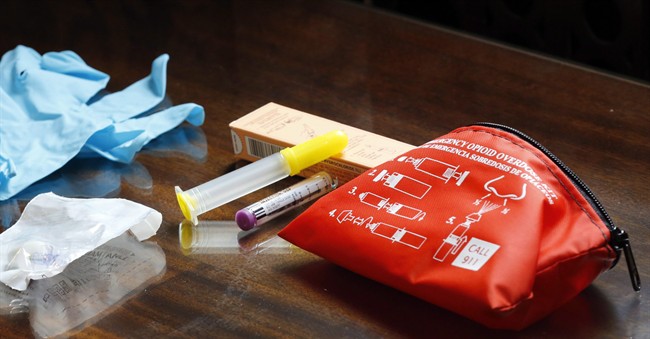The news of a new program for treating drug overdoses in Nova Scotia hasn’t changed the mind of New Brunswick’s chief medical officer.

Dr. Jennifer Russell, the province’s acting Chief Medical Officer of Health, says the province is continuing with a review to determine what the province will do — though they’ll now put Nova Scotia’s model under consideration.
“The Department of Health has established an interdepartmental task group,” said Russell in a statement on Thursday.
“(They will) provide expertise and oversight in the development of guidelines and plans for the prevention, monitoring, preparedness and response to opioids in New Brunswick.”
READ MORE: New Brunswick prepares to deal with ‘opioid crisis’, increase accessibility to naloxone
The Nova Scotia model
Nova Scotia announced on Wednesday that naloxone, a drug capable of blocking the effects of opioids, will be available for free at more than 300 pharmacies starting Sept. 1.
“By putting naloxone in pharmacies we want to make it accessible to everyone in a convenient and trusted location, one that doesn’t carry a stigma if you’re to go in to visit,” said Nova Scotia’s Health Minister Randy Delorey at the announcement.
Naloxone kits have also been provided to 130 sheriffs, 86 corrections officers and 1,900 police officers across Nova Scotia so far.
As well, take-home naloxone kits will be given to drug users as they integrate back into the community.
READ MORE: Nova Scotia opioid use, overdose framework includes free naloxone access
- Life in the forest: How Stanley Park’s longest resident survived a changing landscape
- ‘They knew’: Victims of sexual abuse by Ontario youth leader sue Anglican Church
- Carbon rebate labelling in bank deposits fuelling confusion, minister says
- Buzz kill? Gen Z less interested in coffee than older Canadians, survey shows
New Brunswick and opioids
New Brunswick’s inter-departmental task group on opioids said earlier this year that the province has one of the lowest rates of fentanyl use of any province in Canada, an extremely potent opioid and heroin substitute, in the country.
However, they’re also preparing if the situation worsens.
“These numbers don’t mean that the work that’s underway is not important. On the contrary, it affords us the opportunity to prepare ourselves for a situation which might worsen over time,” said Russell at the time.
According to the task group, many of the province’s first responders are already carrying naloxone kits.
— With files from Adrienne South and Sean Previl, Global News




Comments